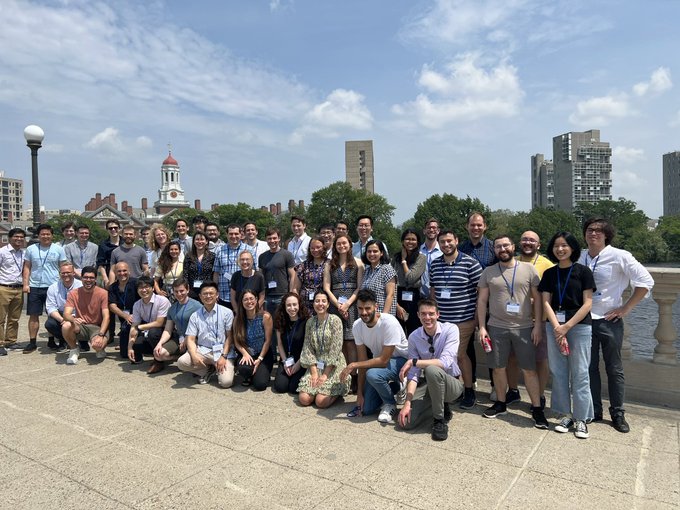
Ludwig Straub
@ludwigstraub
Followers
7,177
Following
854
Media
23
Statuses
530
Explore trending content on Musk Viewer
Kimi
• 80144 Tweets
Ticketmaster
• 54486 Tweets
#PUTV1stWin
• 34606 Tweets
#플레이브_일위밖에_안보여
• 30703 Tweets
KINGPOWER x PHUWIN
• 28293 Tweets
레이브 1위
• 27979 Tweets
Qoo10
• 27241 Tweets
YIBO KSF LEAGUE 2024
• 17266 Tweets
#Oasis25
• 15526 Tweets
ポムの樹
• 13961 Tweets
FORTPEAT IN NAKHON PATHOM
• 10677 Tweets
Last Seen Profiles
Recent inflation and consumer spending numbers have remained strong. Why?
One idea that people seem to dismiss somewhat: Excess savings
“It’s been two years since Biden’s stimulus, everybody already spent it”
A short 🧵 on why that is the wrong way of thinking about it... 1/N
25
148
611
So happy and honored to be among this year's
@SloanFoundation
Research Fellows! Thank you to my wonderful collaborators, colleagues, and mentors!
44
6
280
Couldn’t be happier about this!! Thanks to the AQR Institute at
@LBS
and to everyone who supported me over the last few years!
Congratulations to
@ludwigstraub
, winner of the AQR Asset Management Institute Young Researcher Award 2022. These awards recognise talented new academics producing impactful research in the field of
#AssetManagement
. Read more:
#MonetaryPolicy
#Research
6
10
111
31
5
269
Are you a 2nd yr grad student in econ interested in recent advances in HANK models? Solution methods, fiscal & monetary policy, open economy, estimation? This may be for you 🙂
@a_auclert
, Matt Rognlie and I are running a 3 day workshop at
@nberpubs
in June. Details 👇 Please RT!
3
77
191
Matt Rognlie teaching 35 amazing students how to solve for the dynamics of heterogeneous agent models at our
@nberpubs
het agent macro workshop this morning!
@a_auclert
@BardoczyBence
Michael Cai
2
6
132
Come to our heterogeneous-agent macro workshop in Frankfurt this year! Hosted at the wonderful Goethe University. All the details are below👇
I am delighted to announce the Goethe Macro Training School Workshop on Heterogeneous-Agent Macroeconomics on June 24-26, 2024, in Frankfurt (Germany).
Instructors:
@a_auclert
@rognlie_matthew
@ludwigstraub
.
Link to call for applications:
2
38
144
0
17
107
How does it stop?
One very natural way: Money is earned more and more by richer people who spend it less and less (lower MPCs).
@a_auclert
Matt Rognlie and I call this the “Trickling Up” effect.
The stimulus slowly trickles up the wealth distribution, where it remains. 4/N
3
6
96
(Toy) models are elaborate stories. Here is the story underlying our recent research, without any math. Maybe it gets you to view the world in a slightly different light :)
0
13
94
Some new work on heterogeneous-agent models in an open economy setting. Took us a while to finish it, but finally the draft is out: 👇
The rise in import prices after a depreciation can cause a contraction in a Heterogeneous-Agent New Keynesian open economy model due to households’ high marginal propensity to consume, from Auclert, Rognlie, Souchier, and
@ludwigstraub
0
16
63
0
7
72
If you read a paper today, make it this one👇
0
2
69
It really hurts that Alberto is no longer with us. His office was right next door to my own. Let me share one of the many memories of him I will carry around with me ...
Ciao, Alberto.. Remembering Alberto Alesina's research, contributions, and life with
@EliasPapaioann2
at
@voxeu
(
@HKS
@Harvard
@Unibocconi
)
7
101
466
1
9
68
I had the pleasure of organizing a session on aggregate demand in networks, today 12.15 Eastern, with the fabulous
@jensqu4r3d
, Christina Patterson and
@DBaqaee
. I will share some preliminary work with Asger Andersen, Emil Toft Hansen, Kilian Huber, Niels Johannesen... Join us!
0
7
65
Exactly the prediction coming out of my paper with
@VeronicaGuerri7
@IvanWerning
@guido_lorenzoni
: What looked like a supply shock initially can morph into a demand shock, as financially affected workers won't spend. Despite ~0 risk of infection. Slides:
Will the pandemic add to the global savings glut?
There is a hint in this report from
@KeithBradsher
that Chinese households now want more precautionary savings
1/2
2
22
47
0
13
61
9/N
For more details on all of this, see our recent paper on ‘indebted demand’ 👇
Paper:
Slides:
Youtube talk:
@virtualmacrosem
(incl. Covid discussion after 45 mins)
1
11
58
This is an important thread: This crisis is different from earlier ones because the rich are cutting back on spending massively, and are less exposed to the shock, thus saving more. Maybe helps explain why asset prices recovered so quickly?
1
8
57
Tomorrow (April 1) is the last day to apply to the "heterogeneous agent macro in the sequence space" EABCN training school in Mannheim, June 15 - 17. Details 👇
Hope to see you there!
Thanks to
@klaus_adam
for the initiative behind this!
0
14
57
Thanks for sitting through both papers :) Hope you got something out of them! Definitely thanks for your excellent questions on both.
And now
@ludwigstraub
's second paper of the day at Jackson Hole. I'm not sure when someone last had two papers there.
1
2
41
0
1
51
Deadline for our heterogeneous agent workshop is today !! 23:59 ET... See link below 👇 A few of my personal highlights of our workshop ... a mini 🧵... 1/5
🚨 Heterogeneous-agent macro workshop 🚨 Are you a macro graduate student interested in heterogeneity in macro, monetary policy, and/or fiscal policy?
@BardoczyBence
,
@ludwigstraub
, Matt Rognlie and I are organizing a workshop for you this summer:
6
103
325
1
15
48
12/N
All this is related to great work by many scholars in
#econtwitter
! Tiny sample:
Debt:
@ProfGreenwald
@VeronicaGuerri7
@guido_lorenzoni
@EmilVerner
@MSchularick
@kuhnmo
@alpsimsek_econ
@monacelt
@GautiEggertsson
@paulkrugman
@BIS_org
@michaelxpettis
@AdairTurnerUK
@JoeVavra
1
2
46
Very excited to present this still very young new project! Thanks to the
#OIFM
team for inviting me. You can sign up here: Looking forward to your comments tomorrow!
Tomorrow! Slight correction:
@ludwigstraub
will be presenting "Monetary Policy and Exchange Rates with Heterogeneous Agents: Resurrecting the Real Income Channel" joint with Matt Rognlie & Adrien Auclert
0
2
18
1
2
46
Apply to our het agent workshop this June !! Details here: 👇
🚨 Heterogeneous-agent macro workshop 🚨 Are you a macro graduate student interested in heterogeneity in macro, monetary policy, and/or fiscal policy?
@BardoczyBence
,
@ludwigstraub
, Matt Rognlie and I are organizing a workshop for you this summer:
6
103
325
1
15
42
Can we shorten this? Yes!
Inflation itself slowly erodes the real value of excess savings.
The gov can use higher tax revenue to “mop up” some excess savings by reducing debt (similar to nice work by Angeletos
@ChenLian92
@ChristianKWolf
).
The Fed can push rates higher. 7/N
4
3
43
Our paper benefited from great work by:
@FlorinBilbiie
@gprimice
:
Aladangady Cho
@laurafeiveson
Pinto:
Farhi
@IvanWerning
:
@christianbaye13
@bornecon
@RalphLuet
Mueller:
9/N
1
1
43
2/N
First, we look at who *holds* household debt in their portfolios. Recent work with
@AtifRMian
and
@profsufi
shows it’s mostly pension funds, time deposits of big corp's, foreign central banks & investment funds. These funds & their owners have a very high propensity to save!
3
3
38
Brilliant thread that explains why sovereign debt restructuring for emerging markets is key to avoid weak demand going forward, incl. for advanced economy produced goods & services.
Good article on sovereign debt restructurings. We should recognize that countries struggling to repay debts are also countries struggling to pay for imports, and the more they do of the former, the less of the latter. In fact the...
via
@financialtimes
1
30
84
1
11
38
@gchodorowreich
and I are looking for a pre-doc that would work closely with us at Harvard! If you're excited about macro research, consider applying at the link below 👇 Please RT!
@econ_ra
#EconTwitter
Professors
@gchodorowreich
and
@ludwigstraub
are hiring a pre-doc in macroeconomics. Apply below!
3
34
77
2
11
38
Praise you don't get every day... Thank you
@paulkrugman
for reading our paper with
@VeronicaGuerri7
@IvanWerning
and
@guido_lorenzoni
and posting your comments!
0
3
37
Fantastic thread summarizing our work on inequality, debt and aggregate demand.
The world economy entered the COVID-19 crisis with very low interest rates and very high debt levels, which will complicate policy efforts to boost the economy. We released two
@nberpubs
papers that address how this happened and what it means for policy (
@AtifRMian
@ludwigstraub
)
2
70
176
1
1
36
13/13
Saving of rich:
@M_De_Nardi
@ben_moll
@GNatvik
@KarenDynan
Secular stagnation:
@LHSummers
@GautiEggertsson
@LukaszRachel
@sanjayrajsingh
@annastansbury
@Realprofneil
And lots on inequality, too! Probably forgetting many, feel free to add below!
Thanks for reading my thread!
3
5
36
Maybe a bit fast, but here you can slow it down arbitrarily! Thanks so much for having us, Erik Hurst,
@GregWKaplan
@glviolante
!
1
5
36
In 20/21, the US gov. transferred >15% of GDP to its citizens, financed by higher gov. debt. A lot of it was needed and spent with high MPCs, see eg evidence of Chetty
@nhendren82
@p_ganong
@pascaljnoel
@JoeVavra
. Boosted aggregate demand and inflation in 21.
End of story?
2/N
2
1
37
Hello
#econtwitter
,
@gchodorowreich
, Emmanuel Farhi and myself are looking for an enthusiastic full-time macro pre-doc. Strong coding skills desired. Please share and apply!
@econ_ra
Details here:
2
16
33
What an exceptional group of students! Definitely check out our materials below 👇
Wrapping up a fantastic 3-day session at
@nberpubs
with 40 fantastic students. The future of heterogenous-agent macro is bright!
For those who couldn’t attend, our code and lecture notes are online:
@ludwigstraub
@BardoczyBence
5
51
316
0
0
34
Great coverage by
@martinwolf_
of our recent work on inequality and debt with
@AtifRMian
and
@profsufi
.
@martinwolf_
's insightful pieces have always been a source of inspiration to me, so it's very special to me to read him cover one of some of my own papers! Thank you!
0
5
33
I know it's not where people's minds are right now, but the deadline for our HANK workshop at NBER is today! Details below 👇
1
6
31
Come see
@IvanWerning
present an update to our paper on
#Covid
with
@guido_lorenzoni
and
@VeronicaGuerri7
! Now live on
1
2
22
@HellerHurwicz
@KyleHerkenhoff
@UMNews
Congratulations both! Funny that they made you wear the same shirt and sweater for the pictures.
0
0
20
@peterhtillmann
I used to spend hours on TikZ creating these flowcharts until
@IvanWerning
showed me how simple this is to do in Keynote...
1
1
18
Starting now! Come see
@VeronicaGuerri7
present an update of our paper with
@guido_lorenzoni
and
@IvanWerning
!
Tomorrow at 12:30 PM ET, Veronica Guerrieri will join us to talk about
#COVID19
supply shocks. Register here:
0
8
24
0
2
16
... PS: I did end up suggesting to go skiing in the White Mountains to the macro candidate, but it ended up not working with his schedule. Gladly, he accepted our offer and I'm excited to have you around soon, Adrien Bilal from
@PrincetonEcon
, after a postdoc at
@BeckerFriedman
!
2
0
16
Fascinating piece by
@garyseconomics
on the likely effects of the Coronavirus recession on debt and inequality. Also found that Gary's website aligns extremely well with my own current thinking, and work with
@AtifRMian
and
@profsufi
. Check it out!
1
5
15
Nice coverage of our paper by
@gavyndavies
!
The FT’s
@gavyndavies
writes about our paper in “The deflation threat from the virus will be long lasting”
@VeronicaGuerri7
@guido_lorenzoni
@ludwigstraub
0
8
46
0
3
11
Slight correction to the slight correction 😉 The project is joint with Matt Rognlie &
@a_auclert
*and* a fantastic graduate student
@Stanford
, Martin Souchier!
0
1
10
Interessanter Thread,
@christianbaye13
. mE sind zwei Elastizitäten wichtig. Die intertemporale (wie leicht lässt sich der Energiekonsum einfach auf später verschieben) und die intratemporale (wie leicht lässt sich der Energiekonsum heute mit Konsum anderer Güter substituieren).
die genutzt werden können, um, basierend auf vergangenem Konsum, an Haushalte zurückzuverteilen. Dann bleibt Nachfrage im Inland.
Was übersehe ich? Ehrliche Frage an den Experten
@ludwigstraub
CC:
@ben_moll
@BachmannRudi
@econ_stardust
@bornecon
@RalphLuet
1
0
8
1
0
9
@teasri
@DominikLeusder
@TheStalwart
@profsufi
@AtifRMian
@M_C_Klein
@michaelxpettis
Here is a simpler version of
@teasri
's r - Y plot that we found to describe 'indebted demand' quite well in our work. Basically demand slopes down in debt service cost r * debt. If debt is high, r must fall. Impossible at ZLB, so we get stuck.
0
2
9
Hands down one of the best run hybrid conferences I've been to, by
@jialanw
, Scott Baker, and Steve Zeldes. See here for videos + a summary thread:
1
0
8
@wdiamond_econ
@arpitrage
@Simon_Mongey
How about rising inequality => falling r* + rising asset prices + rising wealth inequality, amplified by nice recent work of
@ProfGreenwald
,
@matteoleombroni
,
@HannoLustig
,
@SVNieuwerburgh
=> bottom 90 borrowed against rising asset prices?
1
0
7
@serdarozkanEN
@AtifRMian
@profsufi
Thanks Serdar! That's very interesting. As long as ZLB not binding, house prices would actually increase the smaller r* is, thus allowing more borrowing as documented by
@MSchularick
@kuhnmo
. At ZLB, you're exactly right, there house prices fall, worsening the recession!
0
0
6
@p_ganong
Great Q. Imagine we can "identify" excess savings purely based on deviation from pre Covid trend in net worth by group of households (not just liq. assets). Extreme but let's start there. Then you could see trickling up by movement of excess savings distribution to the rich.
1
0
6
@MalmbergSelma
@a_auclert
@BardoczyBence
Thank you for the kind words, Selma! It was great to have you there!
0
0
5
Must-read thread and paper for anyone interested in household debt!
The consequences of the
#covidcrisis
are the macroeconomic topic of the day. Many observers & researchers compare the situation to the global financial crisis of 2008. A key difference is the large rise of household debt & asset prices that pre-dated the financial crisis. 1/17
2
27
92
0
2
5
@SVNieuwerburgh
@PorzioTommaso
@Simon_Mongey
@wdiamond_econ
@arpitrage
@ProfGreenwald
@matteoleombroni
@HannoLustig
To reconcile: Our paper focuses on saving. But demographics plausibly has effects on investment as well (e.g. if population growth rate falls), through which it can reduce the natural rate.
2
0
5
@p_ganong
@arindube
@IvanWerning
@Claudia_Sahm
@SorryToBeKurt
@yfatihkarahan
Rohan's JMP seems relevant here . Also
@R2Rsquared
's work with Alisdair McKay.
0
1
5
@HannesMalmberg1
Ha, that's a good question! There is probably a "causal" way of drawing arrows, but then I would have lots of market clearing conditions there that need to be solved out :) The W/P here is basically a solved out labor market clearing condition...
3
0
4
@mdoepke
@ulbricht_robert
Thank you, Matthias! Probably fair to say that without you, neither of us would be where we are today... 🙏
1
0
5
@janschymik
Great Q. Not in the paper. Whether there is a difference pandemic vs not comes down to whether MPCs are different during pandemic vs not, and whether monetary response is different. MPC evidence seems similar, but monetary response may have been stronger outside pandemic.
0
0
6
@FlorinBilbiie
@DBaqaee
@LucaFornaro3
@FZanettiOxford
@lorenzarossi3
@chrisedmond
@virgiliu79
@Basile_G
Thanks for the great thread, Florin! Looking forward to reading the paper. Also cc'ing
@IvanWerning
1
0
4
@m_maggiori
@WenxinDu
@HannoLustig
@MukhinDA
@fdhassan
@twilliams8
@BPellegrino_UMD
@RichRHC
@VStavrakeva
@FedericoHuneeus
@Federomei1
Thanks for this, Matteo! Very generous of you!
0
0
4
Very important thread on sustainability of US government debt.
(1/N)
How bad is the US debt and deficit situation? A Serious Question for Twitter
by
@ProfJAParker
MIT and NBER
Abstract: Debt and deficits are huge and the Fed is hiding funding costs. Is the US already unable to finance itself?
12
43
140
0
0
4
@SakiBigio
Great Q. I haven't done the math here but my sense is if the increased stimulus was totally inflated away already, debt / GDP should effectively be back to pre-Covid levels. It has declined recently but not that much yet. So from that angle, real excess savings still seem > 0.
1
1
5
@pontus_rendahl
@AmbrogioCB
@SedlacekPe
@td_econ
@drewkoke
@_LukasFreund_
@Wouter_Den_Haan
Happy birthday,
@Wouter_Den_Haan
!!
0
0
4
















































































